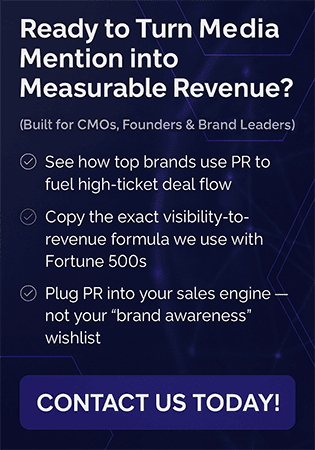So your B2B tech company has hit its stride. You’re signing new clients, honing your product offerings, and even attracting some industry attention.
The time has come: you’re ready to invest in B2B PR. Phew! That’s a good decision you made.
Now, though, you’ve got another choice to consider: should you keep it in-house, or go with an outsourced PR agency?
That will depend on everything from your team’s strengths, to your budget, to your goals. In this blog post, we’ll walk you through what in-house PR vs. outsourced PR looks like, and how to decide which is right for you.
First, however, let’s look at what PR can bring your brand, and why you need it.
PR helps tech companies stand out and dominate their niche in an extremely crowded market
Any company can benefit from digital PR efforts, but B2B tech companies, in particular, need them if they’re going to establish themselves long-term.
Take a look at these numbers from TechRepublic, for instance.
- In 2019 in the U.S. alone, there were 557,000 tech businesses.
- 13,400 tech startups were launched in 2020.
- The tech industry employed 12.1 million people in the U.S. in 2019.

As you can see, the industry is massive, and continually growing (although the rate of failure for tech startups is also high at 63%, according to Embroker). We hate to break it to you, but the chances of standing out from the other 556,999 companies in your industry based on the merits of your product alone are basically zero.
With the amount of content, advertising, and just plain noise on the internet, the only way to grab market share and make yourself top-of-mind among your audience is through PR: specifically, by layering digital PR with traditional PR efforts.
Related post: Digital PR vs. Traditional PR: Which is Better for Your B2B Company?
What does outsourced B2B PR look like?
When you outsource your PR, you’ll be working either with a freelance media specialist or with an agency (depending on how extensive your needs are).
If you choose to go with a freelancer, he or she will likely handle functions like generating ideas for story angles and pitching media. He or she may also write press releases, news briefs, and other short, newsy-type content for distribution.
Some media specialists also offer social media services, so that’s something to ask when you’re initially interviewing potential freelancers.

Using an agency will give you access to more support and a wider range of PR services. If you sign on with an agency, you’ll have a team of people on your account. That team may include any or all of the following:
- An account manager who handles your communications and client relations.
- A media specialist who handles PR strategy and pitching
- A copywriter or content specialist who assists in writing articles, conducting interviews with your leadership, and otherwise supporting the content creation process
- A social media specialist who handles your social media presence
- A graphic designer to create visual assets to include with pitches and on social media
Together, this team will develop a cohesive PR strategy for your brand based on your own knowledge and research—any B2B buyer personas you’ve developed, your audience data, goals, etc.—as well as their own research into your brand, the audiences you’d like to reach, and their knowledge of and connections in the tech media.
What does in-house B2B PR look like?
If your PR is in-house, that simply means that your own employees handle your PR efforts.
Depending on the size of your company, PR efforts may be absorbed into an existing department, like the marketing department, or you may decide to hire a full-time PR professional or staff an entire PR department.
In-house PR departments usually consist of the following individuals, though job titles may vary:
- VP of Public Relations—the department head who manages the PR team, signs off on campaign ideas and serves as the connection between the C-suite and the PR department
- Lead publicist/media specialist—a senior publicist (also called a media specialist) who may take the lead on campaign ideation, higher-level campaign management, data and results analysis, etc.
- Publicist/media specialist—a more junior employee with less experience in PR who helps execute PR campaigns, manage them day-to-day, pulls reports, and does the “grunt work” to support the lead media specialist and head of the department
The size of the team will depend on the complexity of your PR efforts and the size of your budget. Often, a brand will hire the head of the department and rely on their expertise to determine the personnel resources he or she will need.
Now that that’s covered, let’s take a look at the pros and cons of each type of PR.
Pros and cons of outsourced PR
Now let’s consider outsourcing your PR to a freelancer or PR agency that specializes in your industry.
Once you’ve found your candidates through word-of-mouth, online searches, social media, or a gig worker platform, conducted your interviews, and signed on with one of them, here’s what the process will likely look like.
If it’s a freelancer you’re working with, it will be fairly straightforward: you’ll conduct all your business with that one person, who will bring you media opportunities like guest posts, inclusion in a news article, and interview opportunities on TV, podcasts, online series, and/or radio shows. They’ll also request sound bites and quotes to have on hand for answering reporter queries.
With an agency, of course, the process will be a bit more complex.

First, you’ll likely fill out a questionnaire or document asking about your tech brand, your PR goals, your product or service, and where you’ve been featured before, if anywhere.
Then you’ll meet your team on a call or video chat. These “getting to know you” calls, as we call them at Zen, are essential in order for your agency team to get a good feel for who you are, what your brand does, and who your audience is.
Your team will also be researching your brand, your product, and your competitors during this time.
While most agencies are prepared to ramp up quickly, with B2B tech, the research period can sometimes take longer than for other industries due to the complexity of the product or service.
Medtech, fintech, and enterprise tech, for example, require a nuanced understanding of technology and the differentiators that make one company stand out from the rest. Whether that’s your API integrations, your commitment to privacy, investment in cybersecurity, or deep knowledge of the regulatory environment, B2B tech buyers have specific criteria and needs—and your PR team has to know how to connect with those needs.
This is one reason why, if you choose to outsource, you may want to consider a PR firm that specializes in B2B tech. That way, you know your agency team already has the background and understanding of your industry to enable them to hit the ground running.
Pros of outsourced B2B PR:
- Choose whether to work with a single person or multi-person team, based on your needs and budget
- Access to an agency’s full resources, from content writing to social media to creative to PR specialists
- Availability of agencies that specialize in the B2B tech industry, resulting in less ramp-up time
- Ability to cancel a contract or switch if the agency or freelancer doesn’t meet expectations
- Faster and easier than hiring internally
- Usually less expensive than hiring an internal team
Cons of outsourced B2B PR:
- The team you work with will be working with multiple clients, so you’re sharing their time and energy
- They won’t know your brand as closely as an in-house team will
- They may need more guidance initially, although this need will decrease as your relationship continues
As you can see, deciding whether to hire internally or outsource your B2B tech PR is a decision that depends on many factors. Whichever you choose, you’ll need to consider your goals, budget, and timeline, among other things, as well as how involved you want your PR efforts to be long-term.
If you’d like to talk about the benefits of working with a PR agency that knows the B2B tech industry inside and out, get in touch!
Pros and cons of in-house PR
In-house PR teams can be a good choice for tech brands that have large budgets and operate in sectors that require ongoing engagement with outside entities—for example, regulatory agencies or industry associations.
Take a B2B tech company that’s working in something like medtech—say, medical AI.
This is an area in which privacy issues are serious and changing, regulations are evolving, and public perception is generally somewhat skeptical. A misstep can lead to not only legal ramifications but also a long-term loss of trust from your buyers.
In a case like this, it can be a good idea to have an in-house PR team that knows your brand, product, and sector intimately. That way, they can address potential crises or changes in regulation immediately, with little to no ramp-up time.
Of course, a team like this doesn’t come cheap, and it’s not always easy to find the right personnel to fill your needs.
To sum it up:
Pros of in-house B2B PR teams:
- They’re a part of your team, so they know your brand extremely well
- They focus solely on telling your brand’s story
- They work 40+ hours a week developing ideas, pitching, and managing and executing campaigns
- They have the time and resources to understand the technical aspects of your product, as well as the benefits and services it provides
Cons of in-house B2B PR teams:
- Expensive in terms of salaries and benefits
- Require oversight from the C-suite, like any other department
- Require time and resource investment to hire
- Potential for high turnover
- Require additional personnel for additional services, like social media
- Can be difficult to find full-time PR staff who have a deep knowledge of the tech industry





